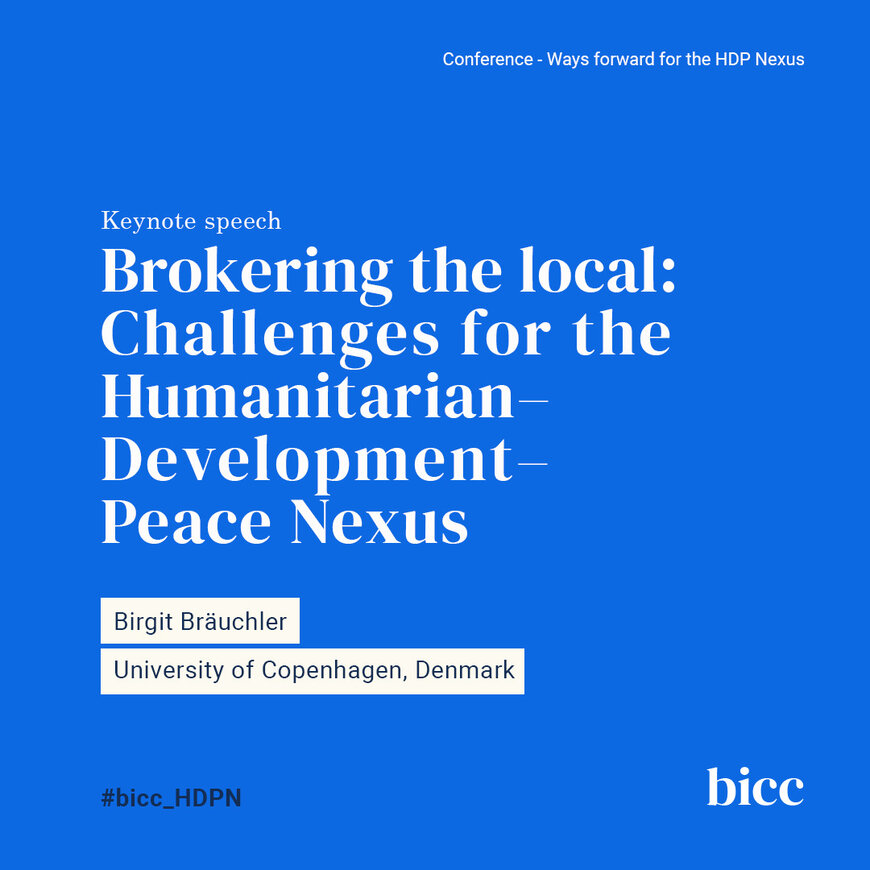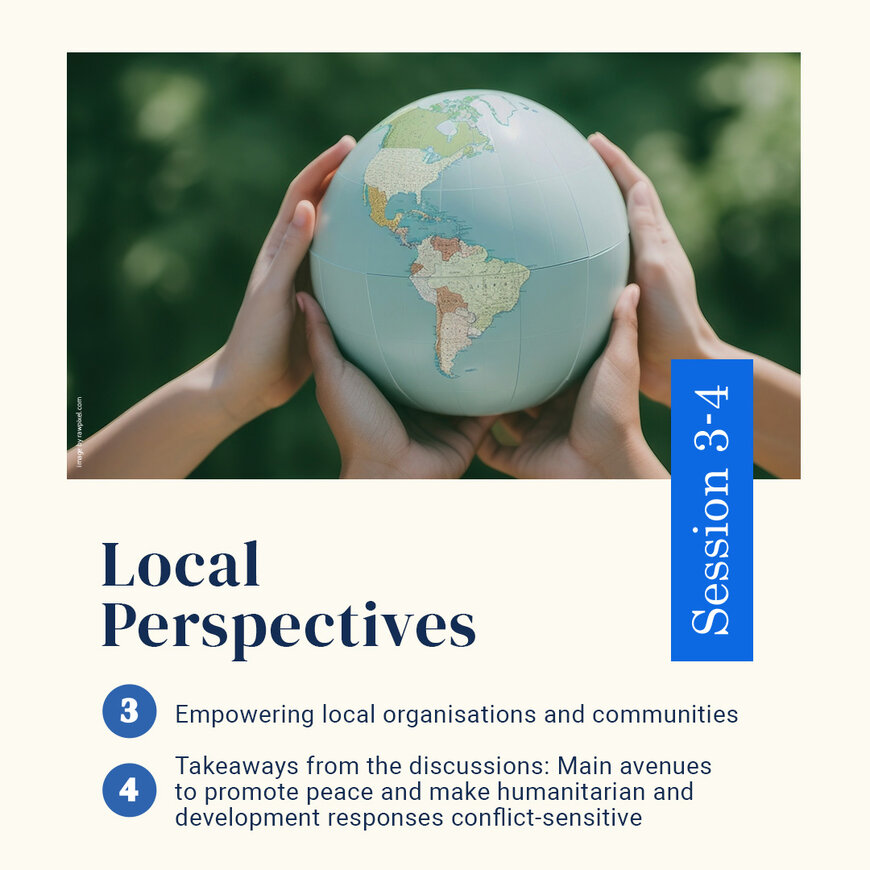Outcome
OUTCOMES
.........
Session 1: Main challenges and possibilities for implementing the P component of the H-D-P- nexus
So-called peace activities—encompassing approaches of conflict sensitivity, conflict prevention and peacebuilding—are often complex and contested. Different peacebuilding approaches can conflict with each other, and peacebuilding objectives are sometimes difficult to reconcile with emergency relief or development objectives. The challenges for peacebuilding activities differ between H, D and P actors, and the panel aims to bring these into dialogue. This panel will seek to answer the following questions: What are possible peace activities and what is political about them? What are the strengths and risks of introducing these activities in the context of protracted crises?
Session 2: Key findings from the research project “How can the HDP Nexus Succeed? NGOs Between Humanitarian Aid, Development Assistance and Peacebuilding”
What is political about peace activities and how does that relate to local concepts of peace? How does a decolonial perspective help us understand this? This session will present findings of the three-year research project on the implementation of the HDP nexus in Iraq, Mali and South Sudan that was guided by these questions. The project has developed a mobile app for implementing organisations, which will be presented on the panel.
Quote from our Keynote Speaker:
"What is the "local"? It is contested and ambigous, without clear borders, continuously reconstructed, challenged—but not random, as it refers to certain historical legacies and customs, and these are highly political. An enhanced understanding of local social hierarchies is needed, also to understand the limitations of local."
Birgit Bräuchler
Session 3: Empowering local organisations and communities
The Grand Bargain, which emerged from the 2016 World Humanitarian Summit, pledged support for greater empowerment of local actors. This included an increase in direct global funding for local NGOs, but also a shift towards more decision-making power for local NGOs and communities. What have been the obstacles to strengthening the role of local NGOs and communities in HDP design and implementation, and how can local NGOs and communities be empowered?
Session 4: Takeaways from the discussions: Main avenues to promote peace and make humanitarian and development responses conflict-sensitive
This session will distil several key messages and recommendations on whether and how peacebuilding activities can be strengthened—even in the extremely difficult conditions of protracted crises for which the HDP is intended. This also requires a re-think: To what extent can conflict-sensitive H and D activities contribute indirectly to peacebuilding, and what red lines should be respected when introducing peace activities? After input from the speakers on these specific questions, conference participants are invited to discuss the takeaways for Part I Political perspectives and Part II Empowering local actors.
Inspiring panellists and participants made our conference very special!
Watch the first conclusions from our wonderful Hear what our wonderful participants and panellists conclude and stay tuned for our sessions tomorrow about practical considerations!
After fruitful discussions with inspiring panellists and participants, we concluded the first day of our #HDP conference by looking at the main ways to promote #peace and make humanitarian and development responses #ConflictSensitive.
Hear what our wonderful participants and panellists conclude and stay tuned for our sessions tomorrow about practical considerations!  https://bit.ly/3ZmWyET
https://bit.ly/3ZmWyET
#HDPN2024 #bicc_HDPN #bicc_bonn
#swisspeace #institutmalienpourlapaix Berghof Foundation @londonschoolofeconomics
Session 5: Financing models for local actors
Donor funding strategies and models are beginning to shift towards more flexible funding but are still too rigid and bureaucratic to accommodate triple nexus approaches. In addition, local NGOs operating in highly challenging contexts find it difficult to meet the criteria set out by international funding calls. What are the funding barriers for donors and implementing organisations? How adaptable are donors willing to be and what do local actors need to be able to participate in international funding calls?
Session 6: Integrating H-D-P- activities within one organisation or project
Organisations working at the local level and trying to combine peace, development and humanitarian relief activities face a range of practical challenges. The timelines of emergency, development and peace projects are different, and capacities to successfully implement each component may not be available in one organisation. Nonetheless, there may be complementarities and synergies between the different approaches. What are the practical challenges and possible synergies of combining the three approaches? How can different timelines and scales be used for an effective, integrated H-D-P approach? What reforms should donors implement to help in this regard?
Session 7: Coordinating HDP actors to promote peace at the local level
At the local level, different actors often have different and sometimes competing agendas for what working towards 'peace' should entail. State actors, UN agencies, INGOs and local NGOs may each have different priorities. Equally, within a given town or village, local elites, armed groups or residents may also have very different visions of peace. For Example, the goal may be "social cohesion" and strengthening the status quo or socio-economic change and reform. Should such goals be unified? Or is the goal of coordination to avoid duplication or even mutual undemining of each other's different activities (such as military missions vs local peacebuilding)? This session will discuss what is the main purpose of coordination and how H, D and P actors can work towards this goal via coordination.







